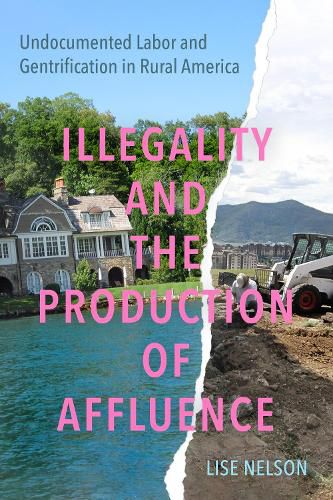Readings Newsletter
Become a Readings Member to make your shopping experience even easier.
Sign in or sign up for free!
You’re not far away from qualifying for FREE standard shipping within Australia
You’ve qualified for FREE standard shipping within Australia
The cart is loading…






Over several decades, the influx of wealthy, white "lifestyle" migrants has transformed the economic, social, and ecological fabric of many rural communities across the United States-from alpine towns of the Rockies to forest and lake communities of the Southeast-in a process akin to urban gentrification. Illegality and the Production of Affluence explores an underappreciated dimension of this process: its dependence on low-wage Latine immigrant workers, many undocumented, who build and maintain gentrified landscapes and lifestyles. Drawing on fine-grained qualitative data, Lise Nelson explores how employers have recruited an unfamiliar workforce to places "off the map" of immigrant settlement. The book also reveals novel insights into how business practices and profitability have shifted through the use of racialized, "illegal," and highly precarious labor. Finally, the book investigates the disjuncture between Latine immigrants' vital role in rural gentrifying economies and their social, civic, and racialized exclusion in the spaces of everyday life.
$9.00 standard shipping within Australia
FREE standard shipping within Australia for orders over $100.00
Express & International shipping calculated at checkout
Over several decades, the influx of wealthy, white "lifestyle" migrants has transformed the economic, social, and ecological fabric of many rural communities across the United States-from alpine towns of the Rockies to forest and lake communities of the Southeast-in a process akin to urban gentrification. Illegality and the Production of Affluence explores an underappreciated dimension of this process: its dependence on low-wage Latine immigrant workers, many undocumented, who build and maintain gentrified landscapes and lifestyles. Drawing on fine-grained qualitative data, Lise Nelson explores how employers have recruited an unfamiliar workforce to places "off the map" of immigrant settlement. The book also reveals novel insights into how business practices and profitability have shifted through the use of racialized, "illegal," and highly precarious labor. Finally, the book investigates the disjuncture between Latine immigrants' vital role in rural gentrifying economies and their social, civic, and racialized exclusion in the spaces of everyday life.